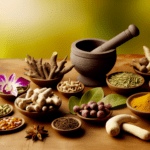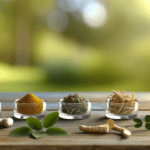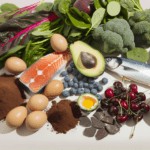The Role of Herbal Supplements in Modern Lifestyles
In the hustle and bustle of modern life, maintaining high energy levels and sharp focus can be challenging. Herbal supplements have emerged as a popular alternative to conventional stimulants, offering a natural way to enhance vitality and cognitive function. With a growing interest in holistic wellness, many individuals are turning to herbs like ginseng, sage, and guarana to combat fatigue and improve mental clarity. These botanicals are not only rooted in traditional medicine but are also backed by contemporary research that suggests their potential in sharpening focus and warding off exhaustion.
Understanding the Interaction with Medications and Side Effects
While herbal supplements offer numerous benefits, it’s crucial to recognize their interactions with medications and potential side effects. Active compounds such as ginsenosides in ginseng or luteolin in sage can influence the body’s biochemistry. For instance, guarana’s high caffeine content may amplify the effects of other stimulants, potentially leading to side effects like jitteriness or insomnia. It’s essential to understand the recommended dosages and to start with lower amounts to gauge individual tolerance.
The Importance of Consulting Healthcare Providers
Before incorporating herbal supplements into your routine, consulting with healthcare providers is imperative. They can offer guidance on safe usage, especially for those with pre-existing health conditions or those taking prescription medications. Healthcare professionals can also help identify any possible herb-drug interactions and advise on appropriate dosages to minimize risks. Personalized medical advice is particularly important when considering herbs like Rhodiola rosea or ashwagandha, which affect stress hormones and may influence energy levels and focus.
Scientific Basis for Energy-Boosting Herbs
Overview of Active Compounds in Herbs
Herbs have been used for centuries to enhance human health, including boosting energy and cognitive function. The efficacy of these herbs can often be attributed to their rich composition of active compounds. For instance, ginsenosides in ginseng, luteolin and rosmarinic acid in sage, and caffeine, saponins, and tannins in guarana are some of the bioactive constituents that have been studied for their energizing effects. These compounds interact with the body’s systems in complex ways to promote vitality and improve mental performance.
Mechanisms of Action in Energy and Cognitive Enhancement
The mechanisms by which herbs enhance energy and focus are diverse and multifaceted. Ginseng, for example, is believed to act on the central nervous system, increasing the release of neurotransmitters that play a role in focus and energy. Sage, on the other hand, acts as an acetylcholinesterase (AChE) inhibitor, thereby increasing the availability of acetylcholine, which is essential for cognitive function. Guarana’s high caffeine content provides a stimulatory effect, while compounds like saponins may contribute to improved mental performance. Bacopa monnieri contains bacosides with neuroprotective properties, enhancing brain function and alertness through the protection of synaptic functions.
Review of Trusted Sources and Studies
Scientific research provides a foundation for understanding the potential benefits of energy-boosting herbs. Studies have shown that ginseng can improve physical performance and mental alertness. For example, doses ranging from 200–1,000 mg per day have been associated with positive effects on energy and cognition. Sage has been demonstrated to improve mood and cognitive abilities in both younger and older adults. Guarana, with its high caffeine content, has been shown to enhance attention and memory performance. Bacopa monnieri, through systematic reviews, has been found to improve information processing and reaction time with daily supplementation of around 300 mg. These findings are supported by a variety of sources, including clinical trials, systematic reviews, and meta-analyses, underscoring the importance of evidence-based use of herbal supplements for energy and focus.

Bette 100% All-Natural Relaxing Lavender Body Lotion.
Chemical-Free
Your relaxing night time body moisturizer to leave the day’s stress behind. Decompress and wish your body good night with the calming scent of lavender.
Top Herbs for Enhancing Alertness and Mental Performance
Criteria for Selecting the Top Herbs
When selecting the top herbs for enhancing alertness and mental performance, several criteria were considered. These include the presence of active compounds known to support cognitive functions, evidence from scientific research and human trials, safety and side effect profiles, and the herb’s historical use in traditional medicine. The herbs chosen have demonstrated potential in improving focus, memory, energy levels, and overall cognitive health.
Individual Herb Profiles and Benefits
- Ginseng: Known for its energy-boosting properties, ginseng contains ginsenosides, eleutherosides, and ciwujianosides. It has been shown to improve physical performance, reduce fatigue, and enhance mental alertness.
- Sage: Rich in compounds like luteolin and rosmarinic acid, sage acts as an AChE inhibitor, potentially improving mood, alertness, attention, and reducing mental fatigue.
- Guarana: With a high caffeine content, guarana is believed to boost attention, alertness, and memory performance. It also contains saponins and tannins that may contribute to its effects.
- Bacopa monnieri: This herb contains bacosides with neuroprotective and cognitive-enhancing properties. It may improve brain function and alertness.
- Peppermint: Inhaling peppermint essential oil can reduce fatigue and boost alertness, memory, and energy levels.
- Rosemary: The terpenes in rosemary essential oil can directly affect the brain, improving cognitive task performance.
- Rhodiola rosea: This adaptogen may reduce mental fatigue, boost brain function, mood, and increase exercise performance.
- Ashwagandha: Known to improve memory, attention, and information processing, ashwagandha may also enhance sleep quality and mental alertness.
- Gotu kola: This herb may improve memory, alertness, mood, and enhance physical functioning in older adults.
- Maca: Maca may boost energy levels, reduce anxiety, and enhance athletic performance.
Comparative Analysis of Herb Efficacy
While all the herbs listed have shown promise in enhancing alertness and mental performance, their efficacy varies based on the individual’s response and the specific cognitive area targeted. For example, ginseng and guarana are particularly noted for their stimulating effects on energy, whereas bacopa monnieri and sage may offer more pronounced benefits for memory and attention. Rhodiola rosea and ashwagandha are adaptogens that not only support cognitive functions but also help the body manage stress, which can indirectly improve mental performance.
It is important to note that the efficacy of these herbs can be influenced by factors such as dosage, form of consumption, and individual health conditions. Therefore, personal experiences with these herbs may differ, and it is crucial to consult healthcare providers to tailor the use of these supplements to one’s specific needs and circumstances.
Do you know the three main ways that your body gets in touch with harmful chemicals with everyday products? Knowledge is Power!
The Ultimate Detox Guide will tell you how to lower your exposure to harmful chemicals!

Potential Risks and Side Effects of Energy Herbs
Common Side Effects and How to Mitigate Them
While herbs can offer a natural way to enhance energy and focus, they are not without potential side effects. Common side effects associated with energy-boosting herbs include nervousness, headaches, upset stomach, irritability, and sleep issues. For instance, guarana, which contains a high level of caffeine, can lead to similar side effects as excessive caffeine consumption, such as rapid heartbeat and increased blood pressure.
To mitigate these side effects, it is important to start with low doses and gradually increase as needed. Monitoring your body’s response to the herb and adjusting the dosage accordingly can help minimize adverse effects. Additionally, ensuring proper hydration and not consuming these herbs on an empty stomach can reduce the likelihood of gastrointestinal discomfort.
Herb-Drug Interactions
Herbs that boost energy and focus can interact with prescription medications, leading to diminished efficacy of the medication or increased risk of side effects. For example, ginseng may interact with blood thinners and affect blood pressure medications. It is crucial to consult with a healthcare provider before combining herbal supplements with prescription drugs. They can provide guidance on potential interactions and advise on the appropriate course of action.
Long-Term Use and Safety Considerations
The long-term safety of energy herbs is not always well-established. Continuous use over extended periods can lead to tolerance, reduced efficacy, and possibly dependency. For example, Rhodiola rosea and ashwagandha are generally considered safe for short-term use, but the effects of long-term consumption are less understood. It is advisable to use these herbs in cycles, allowing for breaks to prevent dependency and to monitor the body’s response over time.
Furthermore, the quality and purity of herbal products can vary greatly, and some may contain contaminants or not contain the advertised amount of the active ingredient. Choosing products from reputable sources and those that have undergone third-party testing can help ensure safety and efficacy.
In conclusion, while energy-boosting herbs can offer benefits, they must be used responsibly, with an awareness of potential side effects, interactions with medications, and considerations for long-term use. Consulting with healthcare providers and selecting high-quality products are essential steps in safely incorporating these herbs into your routine.
By the way, something for you, a little gift!!!
I am just in the middle of publishing my book. It’s about How women can balance their hormones. One part is about food and diet, of course.
Follow this link and enter your email.
I will send you this part of the book for free once the book is published. It has many concrete, practical tips and recipes and will help you feel better during menopause or times of Big hormonal fluctuations.
Annette, Damiva Lead for Health & Wellness

Herbal Supplements vs. Lifestyle Changes
Comparing Herbal Supplements with Diet and Exercise
While herbal supplements can offer a convenient boost to energy and focus, they are most effective when used in conjunction with a balanced diet and regular exercise. Unlike the temporary stimulation provided by caffeine and sugar, herbs work synergistically with the body to support sustained energy levels and cognitive function. However, they cannot replace the foundational benefits of a diet rich in whole foods and the endorphin release and improved circulation that come from physical activity. It’s essential to recognize that supplements should complement, not substitute, the critical pillars of health: nutrition and exercise.
Integrating Herbs into a Healthy Lifestyle
To maximize the benefits of energy-boosting herbs, they should be integrated into a lifestyle that already prioritizes well-being. This means incorporating a variety of nutrient-dense foods that provide the vitamins and minerals necessary for energy metabolism and cognitive health. Regular physical activity should also be a staple, as it naturally increases energy levels and improves mental clarity. When herbs like Ashwagandha, Maca, and Rhodiola are added to such a foundation, they can help address specific concerns such as stress-induced fatigue or focus issues, thereby enhancing the overall quality of life.
Limitations of Supplements for Long-Term Energy and Focus
While herbal supplements can be beneficial, they have limitations. Long-term reliance on any supplement can lead to a diminished response over time, and the potential for side effects or interactions with other medications cannot be ignored. Furthermore, herbs cannot compensate for inadequate sleep, poor diet, or lack of exercise, which are often the root causes of low energy and poor focus. It’s also worth noting that the effects of herbs can vary greatly between individuals, and what works for one person may not work for another. Therefore, it’s crucial to approach herbal supplementation with a holistic mindset, recognizing that it is one piece of the larger puzzle of health and wellness.
Guidelines for Safe Use of Herbal Supplements
Dosage and Administration Recommendations
When it comes to herbal supplements, the adage “less is more” often applies. Starting with the lowest recommended dose and gradually increasing as needed can help minimize side effects and identify the optimal amount for your body. For instance, ginseng is commonly taken in doses ranging from 200 to 1000 milligrams per day, but it’s wise to begin at the lower end of the spectrum. Similarly, sage has been studied at doses of 50 microliters of essential oil, yet it’s crucial to never ingest essential oils without a healthcare provider’s guidance. The key is to follow the manufacturer’s instructions and consult with a healthcare professional, especially if you are combining herbs or using them alongside other medications.
Quality and Purity of Herbal Products
The market for herbal supplements can be a minefield of inconsistent product quality and purity. To ensure you’re getting the best, look for products that have been certified by third-party organizations such as the U.S. Pharmacopeia (USP), NSF International, or ConsumerLab. These certifications indicate that the product has been tested for quality and contains the ingredients listed on the label in the advertised amounts. Organic certifications can also be a marker of quality, as they suggest the herbs were grown without synthetic pesticides and fertilizers.
Monitoring and Adjusting Usage Based on Individual Responses
Herbal supplements are not a one-size-fits-all solution. Individual responses can vary widely, so it’s important to monitor your body’s reactions and adjust usage accordingly. If you experience any adverse effects, such as gastrointestinal discomfort with Bacopa monnieri or increased anxiety with guarana, it’s essential to reduce the dosage or discontinue use. Keeping a journal of your symptoms and any changes in your health can be helpful when discussing your use of herbal supplements with a healthcare provider. Remember, what works for one person may not work for another, and your safety should always be the top priority.
In conclusion, while herbal supplements can offer significant benefits for energy and focus, their safe use hinges on careful dosage, attention to quality, and individualized adjustments. By adhering to these guidelines, you can harness the power of herbs to enhance your well-being while minimizing potential risks.

From unhappy, dry, and sandpaper to silky, smooth and feeling good. That’s Cleo. Cleo is a 100% natural labial balm to moisture and soothe “your other lips”. Cleo is chemical-free, water-free, pH optimized and helps maintain and restore your delicate labial skin’s natural flora. Ideal for daily use or as needed. Get the most silky, lovable lips ever.
Conclusion: Personalizing Herbal Supplement Use for Optimal Benefits
Summarizing the Role of Herbs in Enhancing Energy and Focus
Throughout this article, we have explored the dynamic world of herbal supplements and their role in enhancing energy and focus. Herbs such as Ashwagandha, Chamomile, Echinacea, and Ginseng have been highlighted for their adaptogenic properties, which help the body manage stress and maintain equilibrium. These natural botanicals offer a treasure trove of active compounds that work synergistically to improve cognitive function, increase stamina, and support overall vitality.
Final Thoughts on Balancing Herbal and Conventional Approaches
While herbal supplements provide a natural pathway to improved energy and focus, it is essential to balance their use with conventional health approaches. A holistic strategy that includes a nutritious diet, regular exercise, and adequate sleep is fundamental to achieving long-term wellness. Herbs can complement this lifestyle, but they should not be viewed as a panacea. It is also crucial to be aware of the potential for herb-drug interactions and to consult healthcare professionals when integrating herbal supplements into your regimen.
Encouraging Responsible Use and Ongoing Research
Responsible use of herbal supplements involves understanding proper dosages, recognizing quality sources, and being attentive to individual responses. Consumers are encouraged to select high-quality, pure herbal products and to follow recommended guidelines for use. As the scientific community continues to research the efficacy and safety of these herbs, it is important for individuals to stay informed and make educated decisions about their health. Ongoing research will undoubtedly shed more light on the optimal use of herbal supplements, but until then, personalization and moderation are key.
In conclusion, the journey to enhanced energy and focus through herbal supplements is a personal one, influenced by individual health needs and lifestyle choices. By summarizing the role of herbs, balancing herbal and conventional approaches, and encouraging responsible use and ongoing research, we can navigate towards a state of improved well-being, harnessing the natural power of herbal supplements to live our lives with vigor and clarity.










